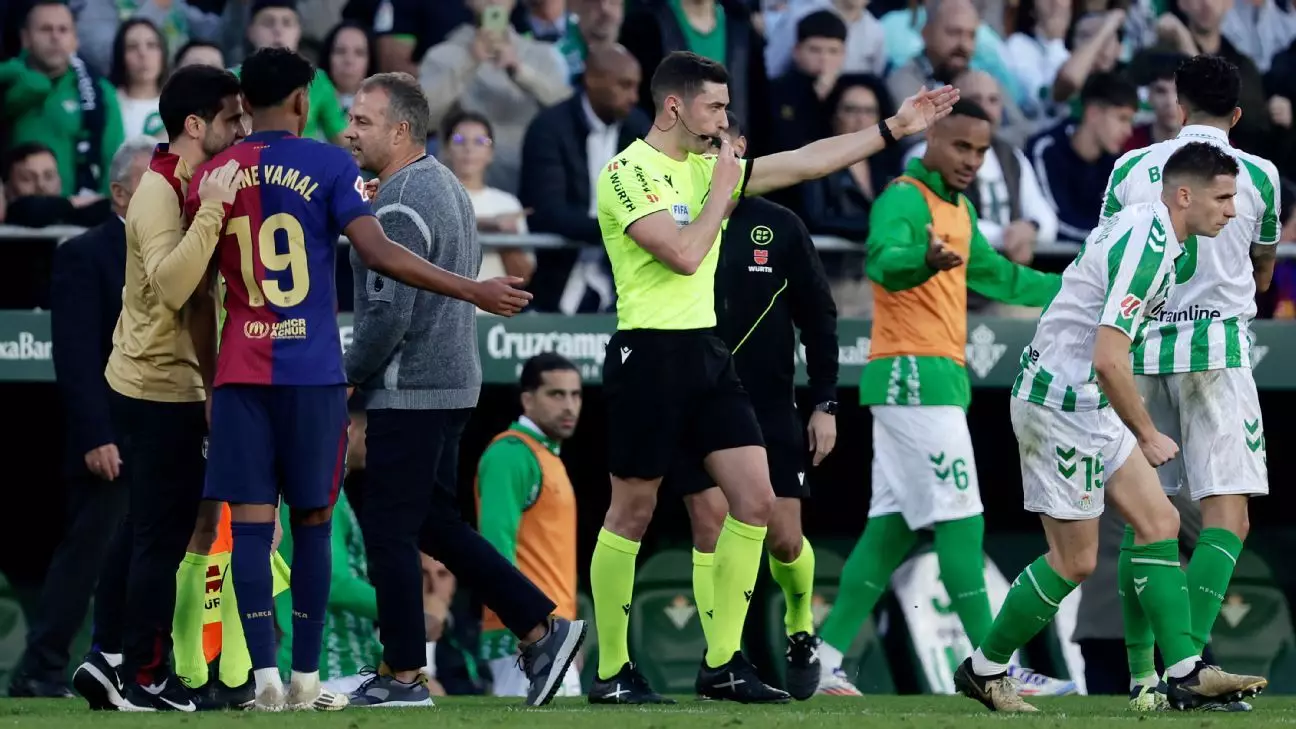The disheartening 2-2 draw between Barcelona and Real Betis on Saturday encapsulated what has become a worrying trend for the Catalan club. Following the match, Hansi Flick minced no words as he criticized his team’s performance, labeling it as “really bad.” This draw marks a dismal stretch for Barcelona, highlighting a troubling disparity between their early-season promise and recent results. With this latest setback, they have only managed to secure one win in their last five La Liga encounters, raising questions about their league leadership status and their ability to maintain momentum moving forward.
The contest showcased Barcelona’s shortcomings, as they failed to capitalize on their lead twice during the game, a symptom of deeper underlying issues. Barcelona’s initial advantage came through Robert Lewandowski—a performance that showcased his individual brilliance—and later through Ferran Torres. However, the inability to hold onto these leads is a glaring red flag for a team that aspires to compete at the highest levels, not only in La Liga but also in Europe.
Barcelona’s defensive lapses have become an increasing concern. The penalty awarded to Betis after a foul by Frenkie de Jong on Vitor Roque was a critical moment in the match, clearly demonstrating a lack of defensive discipline at crucial junctures. The subsequent conversion by Giovani Lo Celso underscored the defensive frailties that plagued the team throughout the match. Flick’s team was not only guilty of inconsistency, but also of failing to manage leads effectively—a precarious position for a side hoping to remain competitive.
Flick’s remarks post-match about needing improvement are indeed justified. He pointed out the youthfulness of the squad as both a potential asset and a burden. Youth often leads to exuberance, yet it can just as easily breed mistakes, particularly under pressure. This duality must be addressed if Barcelona wishes to recover their early season form, as they now face not just a league contender in Real Madrid, but also the daunting task of competing in the Champions League.
Flick’s decisions, particularly his substitutions, face scrutiny. In a game of such high stakes, the choice to replace key players like Lewandowski and Raphinha towards the end can be seen as either a strategic move or a miscalculation. While he cited the forthcoming Champions League match against Borussia Dortmund as a reason for preserving players, the timing of his substitutions was puzzling. The results of substitute players can vary, and in crucial moments, the wrong choice can lead to dire consequences, as seen in Betis’s last-minute equalizer courtesy of Assane Diao.
Flick’s admission regarding the need for fresh legs speaks to a larger narrative concerning squad rotation and player management. The balancing act of maintaining player fitness while ensuring competitive performance is a tightrope Barcelona must learn to navigate effectively. For a world-class team, failure to optimize talent can be detrimental to aspirations, especially as the season progresses.
The dynamics of the match shifted significantly following Flick’s dismissal—acting at times as a catalyst for events that commenced after his exit from the technical area. This moment emphasized the intense atmosphere of competition, where emotions can take over, leading to unintended consequences. Flick’s frustration derived from the prolonged VAR review of the penalty decision speaks to the growing frustrations managers face with officiating in modern football.
Moreover, the dramatic events surrounding his dismissal might overshadow other aspects of what transpired on the pitch, including moments of brilliance from young players like Lamine Yamal. His contributions, notably the assist for Torres’s goal, highlight the flashes of promise within an otherwise struggling squad.
As Barcelona continues to grapple with internal and external challenges, they must focus on resilience moving forward. The path ahead requires not only tactical adjustments but also an introspective look at team dynamics, mindset, and approach to critical moments in matches. While promising starts have faded, the essence of the team remains rooted in potential.
The upcoming fixtures present both a challenge and an opportunity for Barça. They will need to transform their system of play and fortify their resolve if they hope to rekindle their early-season form and reclaim their status as a serious contender on all fronts. The continued evolution of this young team under Flick’s stewardship will undoubtedly be a focal point in the weeks to come—a potential story of triumph or further tribulation in their storied history.
